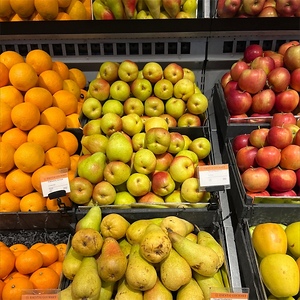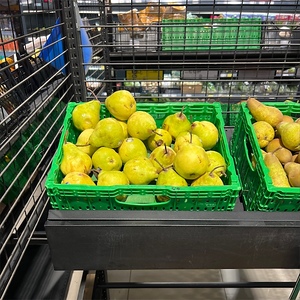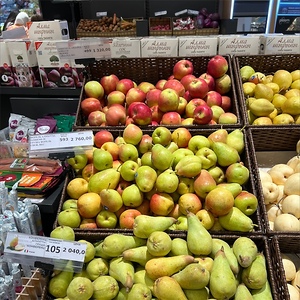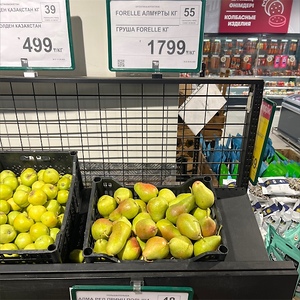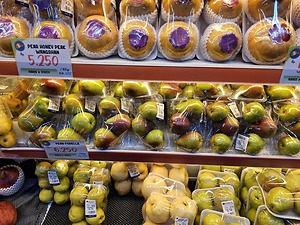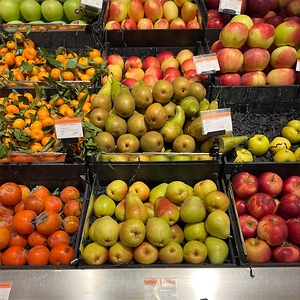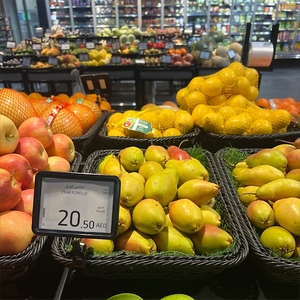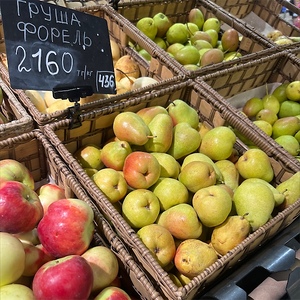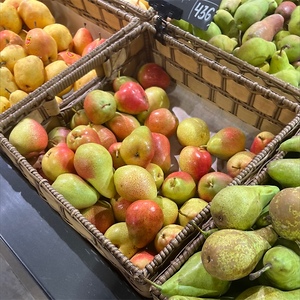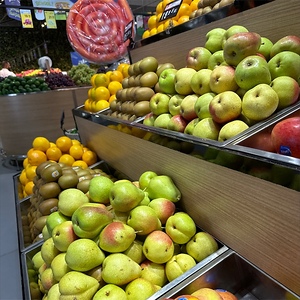

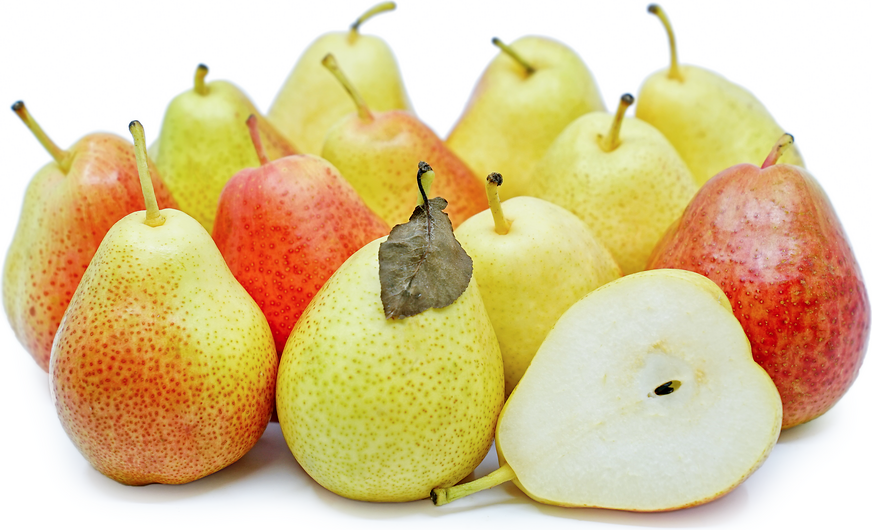
Forelle Pears
Estimated Inventory, 25 lbs : 0
This item was last sold on : 06/26/25
Description/Taste
Forelle pears are small in size, averaging 5 to 7 centimeters in length, and have a uniform, pyriform shape with a rounded, bell-like base tapering to a short neck. The variety features a slender, straight, light green stem, and the skin is smooth, thin, and taut with a waxy sheen. Forelle pears are known for their distinct appearance. The skin transitions from green to yellow with maturity and is flushed with patches of bright red hues. The skin is also covered in prominent lenticels, which are dot-like pores scattered across the surface. Underneath the skin, the ivory to white flesh is dense, coarse, and firm with an aqueous, crisp consistency. Forelle pears are typically firmer than other European pears and retain a crunchiness, even when ripe. The flesh also envelops a central fibrous core filled with tiny, black-brown seeds. Forelle pears emit a pleasant aroma with maturity and are edible raw once ripe. The variety has a refreshingly sweet, tangy, and bright taste with spice-like nuances of cinnamon.
Seasons/Availability
Forelle pears are available in the fall through winter. In Europe and the United States, the variety is typically found between September and January, sometimes into March in Europe. Forelle pears are harvested from mid-February through August in the Southern Hemisphere, depending on the region where they grow. Once picked, the pears can be kept in professional cold storage for 3 to 5 months.
Current Facts
Forelle pears, botanically classified as Pyrus communis, are a German variety belonging to the Rosaceae family. The late-season pear grows on trees reaching 3 to 4.8 meters in height and was initially discovered as a chance seedling in the late 17th century. Forelle pears were selected as a commercial cultivar for their colorful appearance, small size, and firm, crunchy flesh. The variety is only grown in limited quantities and has a short harvest window, making it a somewhat rare commercial cultivar. Forelle pears are harvested when they are mature but not fully ripened. They are also stored for several weeks to allow their flavor to mellow and their texture to soften. Some countries, like South Africa, choose to market the fruits in a firmer, crisper state, based on consumer preference. Forelle pears are sought for their dense, crunchy, and juicy nature and are positioned in markets as fresh-eating, snacking pears.
Nutritional Value
Forelle pears have not been extensively studied for their nutritional properties. European-type pears, in general, are a source of fiber to aid in digestion and vitamins A, C, E, and K to strengthen the immune system, guard cells against free radical damage, assist the body in faster wound healing, and maintain healthy organ functions. Pears also provide minerals like potassium, calcium, phosphorus, copper, iron, magnesium, manganese, and zinc. Potassium helps the body balance fluid levels, calcium and phosphorus support bones and teeth, copper contributes to nerve health, while iron develops the protein hemoglobin for oxygen transport through the bloodstream. Magnesium assists in controlling nerve functions, manganese aids in energy production, and zinc helps with tissue repair.
Applications
Forelle pears have a refreshingly sweet and subtly tangy taste suited for fresh and cooked preparations. The small fruits are favored as snacking pears and are commonly eaten raw, out of hand. Forelle pears have slightly firmer flesh than other commercial European pears and hold their shape when sliced and tossed into salads. The variety is also served on cheese boards for their sweet taste and is often eaten with tart cheeses. Try adding Forelle pear slices to parfaits, oatmeal, or Greek yogurt. They can also be wrapped in prosciutto and eaten with greens or herbs as a bite-sized appetizer. While less common, Forelle pears are sometimes chopped and added to slaws and salsas as a crunchy element or made into purees to accompany roasted meat. In addition to fresh preparations, Forelle pears can be cooked, but are not widely used due to their small size. The variety can be wrapped in pastry and baked whole, poached as a decadent dessert, or combined with other fruits in a pie or tart filling. Forelle pears can also be layered into sandwiches, cooked in caramel, butter, or other sweet sauces as a topping for ice cream, or blended into various juices, smoothies, and beverages. Forelle pears complement aged cheeses such as gorgonzola, goat, gouda, and manchego, fruits like mangos, apples, and figs, herbs including mint, parsley, and thyme, and nuts such as walnuts, hazelnuts, pecans, and pistachios. Whole, unopened Forelle pears will keep for a few days at room temperature to ripen. Once mature, it is recommended to immediately consume for the best quality and flavor. Ripe Forelle pears can also be stored in the refrigerator for a few weeks.
Ethnic/Cultural Info
Forelle pears acquired their name from their brightly colored, speckled skin. The name Forelle is derived from German and translates to “trout.” Forelle pears were thought to be given this name from their skin’s similarity in coloring to the freshwater fish. A distinguishing feature of trout fish is their speckled appearance, and some species, such as the rainbow trout, have a blend of colors on their scales of red, pink, green, and yellow hues. Forelle pears share a coloring and speckling akin to trout, and the fruit’s name became a memorable moniker throughout Europe.
Geography/History
Forelle pears are native to Germany and were discovered as a chance seedling sometime in the late 17th century. Much of the variety’s history is unknown. Some sources claim the variety may have originated in the Saxony region of Germany and was commercially introduced in the mid to late 19th century. Forelle pears are a winter variety that thrives in regions with periods of cooler weather to successfully produce fruit harvests. After their commercial release in Germany, the variety spread across Europe and was eventually carried to the United States through migrating European populations. Forelle pears were also planted in South Africa and Australia for commercial cultivation. Today, Forelle pears are an heirloom variety grown on a small scale in Europe, the United States, Australia, South Africa, and Chile. In the United States, the variety is primarily cultivated in Oregon and Washington. When in season, the fruits are available through select fresh markets, retailers, and wholesalers.
Featured Restaurants
Restaurants currently purchasing this product as an ingredient for their menu.
| US Grant Hotel Main | San Diego CA | 619-232-3121 |
Recipe Ideas
Recipes that include Forelle Pears. One
Podcasts



